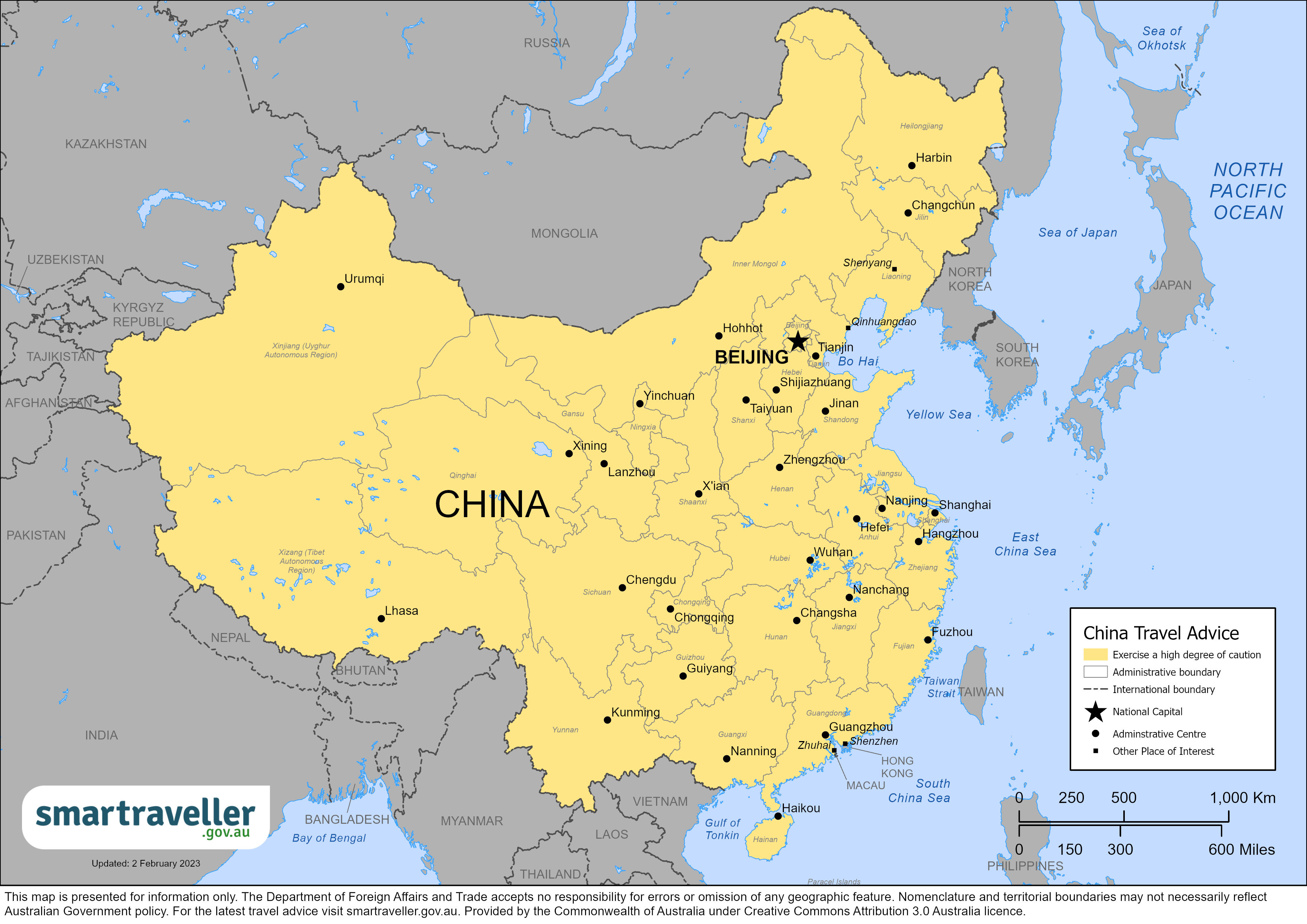Water
Depending on your location, tap water in China may be unsafe to drink.
Drink only bottled water with sealed lids.
Bird flu (avian influenza)
People have died from avian influenza in China. Avian influenza virus strains continue to circulate in poultry in China.
The primary source of infection seems to be poultry handled in poultry markets.
To protect yourself from avian influenza:
- stay away from live poultry
- don’t visit live bird and animal markets, including ‘wet’ markets and poultry farms
- practise good personal hygiene
When preparing food, handle poultry properly. Thoroughly cook all parts of the poultry.
More information:
HIV/AIDS
HIV/AIDS is a significant risk in China.
Take precautions if you engage in activities that expose you to the risk of infection.
If you need medical treatment, you could be exposed to unsafe blood and blood products. This is a particular risk in regional China.
Ask for sterilised equipment. You may need to pay for new syringes in hospitals or clinics.
Insect-borne illnesses
Japanese encephalitis is widespread in rural southern China from June to August. The disease is also known as encephalitis B. A vaccine is available.
The risk of malaria increases during warm weather and is more significant in rural areas, particularly in the provinces of:
- Hainan
- Yunnan
- Fujian
- Guangdong
- Guangxi
- Guizhou
- Sichuan
- Tibet (Zanbo Valley areas only)
- Anhui
- Hubei
- Hunan
- Jiangsu
- Jiangxi
- Shandong
Dengue cases have risen sharply, especially in Guangdong and Guangzhou. Risks increase during the wet season.
To protect yourself from disease:
- make sure your accommodation is insect-proof
- use insect repellent
- wear long, loose, light-coloured clothing
- consider taking medicine to prevent malaria
- get vaccinated against Japanese encephalitis
Rabies
Animal and human rabies are common. Health authorities report many cases each year.
Be careful with both wild and domestic animals in China.
If you’re bitten or scratched by an animal, get medical help immediately.
Hand, foot and mouth disease
Hand, foot and mouth disease (HFMD) is common. Sometimes serious outbreaks happen.
Outbreaks usually start in March or April and peak in May. However, outbreaks can continue until October each year.
The disease mainly affects children under the age of 10 years. Adult cases, particularly in young adults, are not unusual.
People with HFMD experience fever, blisters and rashes on the hands, feet and buttocks.
The disease is spread by direct contact with nose and throat discharges and faeces of infected people.
To protect yourself from illness:
- wash your hands carefully and regularly
- take other hygiene precautions
More information:
Pollution
High pollution levels are a problem.
Children, the elderly and those with pre-existing heart and lung conditions may be especially affected by pollution.
Authorities issue red alerts when pollution is expected to be especially bad.
When a red alert is in place, authorities:
- close schools
- limit car use
- suspend construction activity
Flights are regularly delayed in China because of smog.
Dust storms occur across the north of China. They can:
- cause eye, nose, mouth and throat irritations
- make heart and lung problems worse
Get medical advice if you’re worried about air pollution.
Follow the advice from local authorities about days with bad pollution and how to reduce your exposure.
More information:
Altitude sickness
Parts of China are at altitudes of over 3,000m, including:
- Tibet
- Qinghai
- parts of Xinjiang
- Western Sichuan
If you travel to those areas, you may get altitude sickness.
People with lung, heart or chest problems should take extra care. Even if you’re healthy, you can still be affected.
Symptoms of altitude sickness include:
- headache
- dizziness
- vomiting
- coordination problems
In severe cases, fluid can build up in your lungs, brain or both, which can be fatal.
To protect yourself from altitude sickness:
- ascend slowly, especially above an altitude of 2500m
- rest when needed and don’t push your body
- avoid alcohol and cigarettes
If you’re affected by severe altitude sickness, get to lower ground as soon as possible.

